Bosch Reports INR 20 Billion Profit For FY2025, Targets Annual Growth Of Upto 8% Till 2030
- By MT Bureau
- May 27, 2025
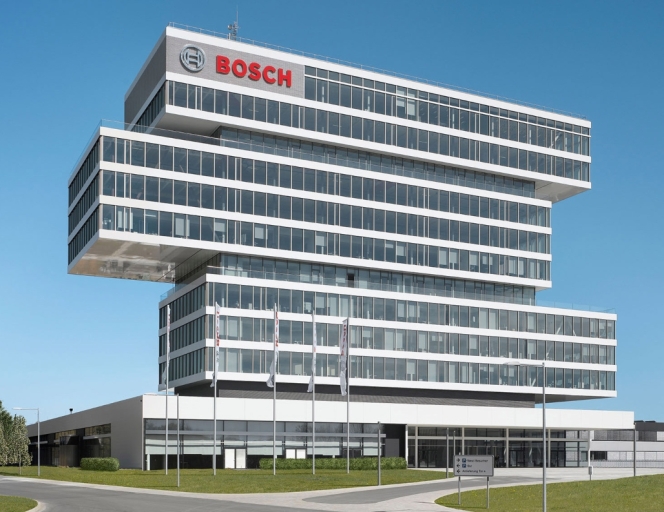
German technology and services major Bosch has announced its financial performance for Q4 and FY2025. The company reported revenue of INR 49 billion in Q4 FY2025, up 16 percent YoY and profit after tax of INR 5.54 billion, up 11.1 percent YoY. It attributed the performance on the back of a buoyant automotive market, particularly within the tractor and passenger car segments.
During the period, Bosch’s Mobility business sector's product revenue grew by 14.9 percent QoQ, driven by increased sales in the off-highway and passenger car segments. The Beyond Mobility business sector saw a flat growth of 1.7 percent.
Guruprasad Mudlapur, President of the Bosch Group in India and Managing Director of Bosch, said, "Amid a challenging business environment, we concluded FY2024-25 with strong revenue growth and increased sales across businesses. Sustained demand in the off-highway and passenger car segments contributed to our performance this quarter. This development reflects our agility in adapting to dynamic market needs and our continuous focus on customer centricity."
For FY2024-25, revenue from operations climbed by 8.1 percent to INR 180 billion, bolstered by increased sales in the off-highway segment and the Mobility Aftermarket business. The profit after tax came at INR 20 billion, which was 11.1 percent of the revenue.
Within the Mobility business sector, product sales for the fiscal year increased by 7 percent, predominantly due to growth in the overall passenger and tractor segments. Domestic sales for this sector also rose by 6.2 percent. The Powertrain Solutions division experienced a 5.8 percent sales increase, driven by the tractor segment and increased export sales. Meanwhile, the Mobility Aftermarket division saw an 8.4 percent rise, thanks to heightened market demand for diesel components and filters. The Beyond Mobility sector recorded a 4.4 percent increase in sales, propelled by the consumer goods segment.
Bosch Limited also announced a strategic decision to divest its 6.97 percent shareholding in Nivaata Systems (Routematic), having achieved its goals for the initial investment made in 2020.
Future Outlook
Sharing his perspective on the company’s performance for FY2026 and beyond, Mudlapur, said, "India is poised to become a leading automotive powerhouse with high levels of engineering and manufacturing excellence. In the coming years, we expect substantial growth in India as a strategic market, with an accelerated shift towards digitalisation, electrification and sustainable mobility. At Bosch, we are fully geared to lead this change and remain committed to being the preferred technology partner for OEMs in India and the world over."
The company anticipates continued growth in non-mobility areas through sustained infrastructural investments, reinforcing its position as a multi-sector technology leader.
The broader Bosch Group is forging ahead with its ambitious Strategy 2030, aiming to solidify its competitive standing. Despite a challenging market environment last year, which saw sales revenue decrease by 1.4 percent to EUR 90.3 billion (0.5 percent adjusted for exchange-rate effects), the group remains focused on its long-term objectives. EBIT (earnings before interest and taxes) from operations stood at EUR 3.1 billion (2023: EUR 4.8 billion), with an EBIT margin from operations of 3.5 percent.
Stefan Hartung, Chairman of the Board of Management of Robert Bosch, affirmed: "In the 2024 business year, we achieved important improvements in terms of costs, structures, and portfolio. We are sticking to our ambitious targets in order to continue to grow and strengthen our financial independence. Our Strategy 2030 gives us the orientation we need, especially in times of global turbulence, to become one of the top three providers in our core markets in five years’ time at the latest.”
Going forward, Bosch has outlined its financial targets of attaining 6 percent and 8 percent annual average growth until 2030, assuming a normal inflation rate of between 2 percent and 3 percent.
- Schaeffler India
- Symposium on International Automotive Technology
- SIAT 2026
- Deepak Kasturi
- Madhurisha VIppatoori
- Harsha Kadam
- Viswanathan Sambasivam
- Omkar Kulkarni
Schaeffler India Showcases Next-Gen Product Portfolio At SIAT 2026
- By MT Bureau
- January 28, 2026
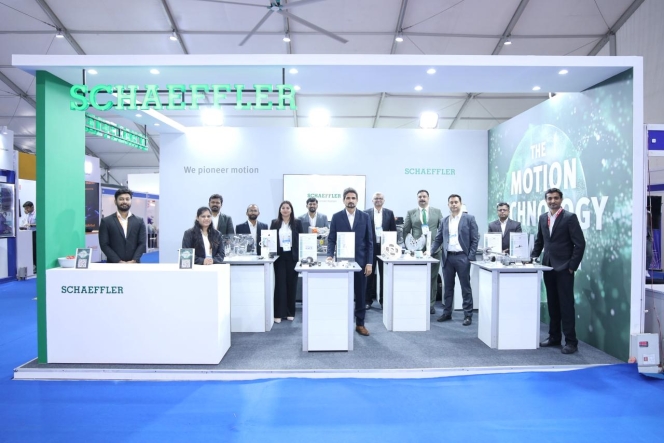
Tier 1 supplier Schaeffler India is showcasing a range of motion technologies at the Symposium on International Automotive Technology (SIAT) 2026. The company's exhibit at Hall Zone D includes electrification solutions such as drives, motors and modules, alongside powertrain systems for internal combustion engines and hybrid vehicles.
The portfolio on display features chassis components, sensors, fuel delivery modules, and bearings designed to reduce friction in vehicles. The company is highlighting its local engineering capabilities and its work with manufacturers to develop mobility solutions within India.
Company executives are participating in the symposium's technical programme. Madhurisha Vippatoori, Chief Technical Officer, is chairing the Testing and Evaluation track. Deepak Kasturi, Head of Innovation India, is delivering a keynote address regarding Euro 7 standards and real-time emissions monitoring.
The company stated that its presence at the event reflects its focus on engineering innovation, energy efficiency and collaborative development with automotive customers and academia.
Harsha Kadam, CEO & MD, Schaeffler India, said, “As a leading mobility solutions provider in India, we at Schaeffler are proud to be associated with all the leading automotive customers in shaping the future of mobility. We are equally committed to supporting our customers across various types of powertrains that will support cleaner, electrified, and intelligent mobility. Together, we are shaping a more secure, sustainable, and future-ready India.”
Viswanathan Sambasivam, Division Head - Powertrain & Chassis India, said, “SIAT provides an ideal platform to demonstrate how we are shaping mobility for India. Our focus is on co-engineering with OEMs, accelerating technology transfer, and strengthening local value creation. The solutions we are bringing this year represent the next step in advancing clean, safe, and smarter mobility.”
Omkar Kulkarni, Division Head - E-Mobility India, said, “India is one of our most important engineering hubs. Our teams here are working closely with customers to design for India, build in India, and innovate for India. The technologies displayed at SIAT underline our ability to combine global expertise with local development capabilities.”
Indian Auto Component Industry Set To Showcase Its Prowess At ACMA Automechanika New Delhi 2026
- By MT Bureau
- January 28, 2026
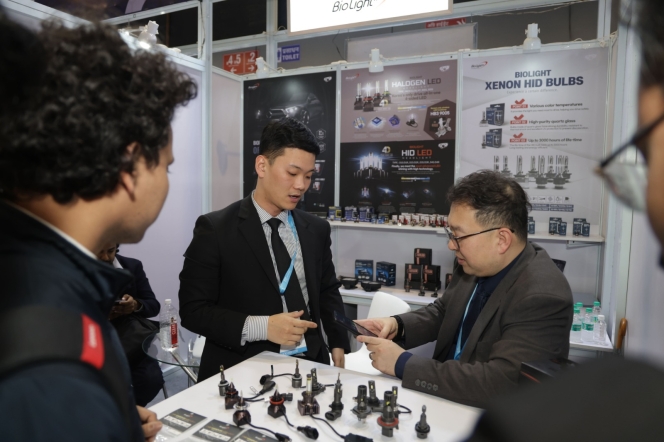
The Indian automotive component industry was valued at USD 80.2 billion in FY2025, with the aftermarket segment contributing USD 11.8 billion. Data from the Automotive Component Manufacturers Association of India (ACMA) indicates the sector grew by 6.8 percent to reach USD 41.2 billion in the first half of FY2026. Industry projections suggest the component market will reach between USD 111 billion and USD 200 billion by 2030.
Against this growth, the ACMA Automechanika New Delhi 2026 trade fair will take place from 5 to 7 February 2026 at Yashobhoomi, New Delhi. Organised by Messe Frankfurt Trade Fairs India and ACMA, the event will host more than 870 exhibitors. The fair serves as a platform for manufacturers, distributors and service providers to showcase innovations in spare parts, electronics, diagnostics and workshop equipment.
The exhibition will feature participation from 20 countries, including Germany, Japan, Korea and the USA. Dedicated pavilions will highlight technologies from nations such as China, Italy and Taiwan. The event focuses on electrification, alternative fuels and digital authentication. Exhibitors will display ethanol-ready components, hydrogen systems and electric vehicle charging solutions.
Raj Manek, Executive Director and Board Member of Messe Frankfurt Asia Holdings, said, “As India prioritises quality-led development across sectors, ACMA Automechanika New Delhi 2026 will showcase how the auto components and aftermarket industry is advancing in sync with global trends. The show will unite visitors and exhibitors in a massive international gathering, converging cutting-edge innovations, sustainable component solutions and clean-fuel ecosystems. Global participants are increasingly drawn to India's pivotal role in this transition, with organisations showing strong enthusiasm for tech-driven solutions to combat climate change and build a thriving and a cleaner future”.
Vinnie Mehta, Director General of ACMA, added, "India’s automotive aftermarket is moving towards a more structured, quality-driven and globally aligned future. The auto component industry grew by 6.8 percent to USD 41.2 billion in the first half of FY26, supported by stable domestic demand, a resilient aftermarket and sustained investments in capacity expansion, localisation and technology upgradation. ACMA Automechanika New Delhi provides an important platform for industry stakeholders to engage with emerging technologies, regulatory developments and global market opportunities”.
Sona Comstar Reports 39% Revenue Growth In Q3 FY2026
- By MT Bureau
- January 23, 2026
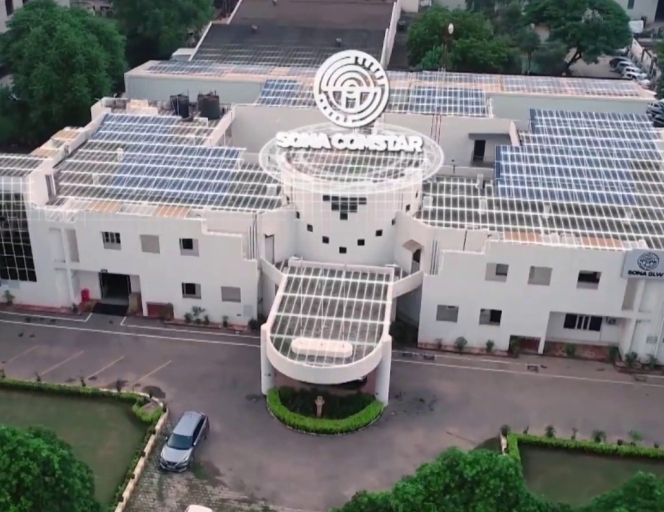
Sona BLW Precision Forgings (Sona Comstar) has announced its financial results for Q3 FY2026, reported revenue of INR 12.09 billion, a 39 percent increase YoY.
The company’s EBITDA grew by 25 percent to INR 3.2 billion with a margin of 25.2 percent, while net profit rose by 20 percent to INR 1.8 billion. Revenue from Battery Electric Vehicles (BEV) represented 38 percent of total turnover.
In the first 9-months of FY2026, the company secured six new programmes, bringing the total to 65 across 33 different customers. Additionally, Sona Comstar was awarded a programme from a new customer to supply hydraulic motor controller.
Vivek Vikram Singh, MD & Group CEO, Sona Comstar, said, “We achieved our highest-ever quarterly revenue, EBITDA, and adjusted net profit in Q3 FY2026. Our revenue grew strongly by 39 percent YoY, primarily driven by the expansion of our electric vehicle traction motor and railway business in India. BEV revenue share improved meaningfully to 38 percent in Q3 from 32 percent in Q2FY2026 and represents our second-best quarter till date in terms of absolute BEV revenue and share. We have commercialised a new product in this quarter, the hydraulic motor controller, leveraging our strengths in motors and controllers to develop the solution for a new application outside the current product portfolio. We continue to add new EV customers and win new EV programs from our existing EV customers. Moreover, we commenced sample production of in-cabin radar sensors in our new SMT line at Chennai facility in this quarter, making us one of the few automotive radar manufacturers in India with local SMT manufacturing capability.”
Valeo Secures Major Interior Lighting Contract Using IMSE Technology
- By MT Bureau
- January 21, 2026
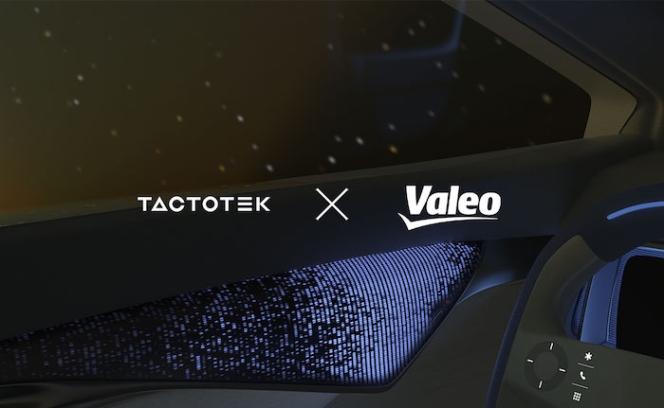
Valeo has received a contract from a global automaker to produce interior lighting systems using In-Mold Structural Electronics (IMSE) technology. The programme utilises solutions from TactoTek to integrate lighting and electronics into a single structure. This award brings Valeo’s total order intake for interior lighting to nearly EUR 1 billion since 2024, a figure that includes light lines, pixelated solutions and smart surfaces.
The project focuses on interior structures where electronics are embedded directly into finished parts. This method produces a flush surface and creates a structure that is thinner and lighter than traditional assemblies. The design reduces material usage and energy consumption while increasing the durability of the components. To support the contract, Valeo has commissioned an automated production line designed for the high-volume manufacturing of these integrated systems.
The collaboration with TactoTek provides the foundation for scaling smart surfaces into large-scale production. By replacing multi-part assemblies with unified structures, Valeo aims to meet industry demand for interiors that combine design and functionality. The new production line is intended to optimise processes for the industrialisation of IMSE-based solutions, which the companies claim offers cost competitiveness and flexibility for future design changes.
Maurizio Martinelli, CEO - Light Division, Valeo, said, “This award sets a new benchmark for next generation interior solutions. Valeo’s lighting expertise and industrial capabilities, combined with IMSE technology, are enabling us to bring highly advanced, smart interior systems into large-scale production. It also reflects our commitment to shaping the future of mobility in a way that brings lasting value to customers globally.”
Jussi Harvela, CEO, TactoTek, added, “Our cooperation with Valeo and the commissioning of a dedicated new production line mark an important milestone in the large-scale industrial adoption of IMSE technology, whose cost competitiveness and ability to support future design evolution were decisive factors in securing the award. This collaboration demonstrates how our vision for smart surfaces transforms into a scalable solution that serves leading automotive manufacturers.”
The integration of electronics into structural parts is a direction for the automotive sector as manufacturers seek to reduce vehicle weight and simplify interior architectures.







Comments (0)
ADD COMMENT